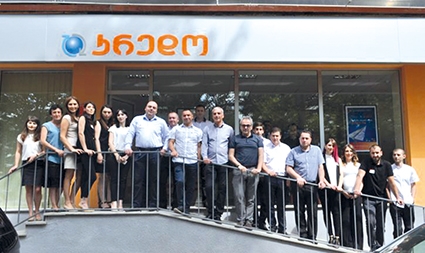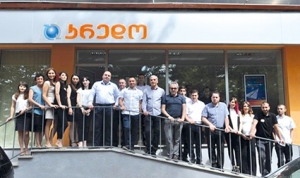Council of Europe Development Bank Grants Credo Bank 5 mln EUR Loan
At a meeting held Friday, November 16, in Paris, the Administrative Council of the Council of Europe Development Bank (CEB) approved eleven loans totaling nearly 1.1 billion EUR.
The loans went to institutions and companies in eleven different European countries, including Georgia. By far the smallest loan approved last week, Georgia’s JSC Credo Bank will be granted a 5 million EUR loan “to finance the productive investments of small businesses throughout the country.”
The CEB said that the aim of the loan is to nurture micro-enterprises and support income-generating activities and self-employment, noting that the unemployment rate in Georgia, at 14% (Geostat, 2017), is considerably higher than the EU average of 8.1% (Eurostat, 2018). Eurostat data reveals that two EU countries have higher unemployment rates than Georgia’s official figure – in September 2018, Greece reported 19% and Spain reported 15%. Many economists, however, have called Georgia’s official data into question, noting that those engaged in subsistence farming are generally counted as employed, although they often get no or very little monetary profit from their work.
In 2017, Credo transitioned from a microfinance institution into a bank in response to new legislation on microfinance institutions in Georgia. The bank’s stated mission is to provide “sustainable financial services to micro, small and medium businesses, with a preference for rural activities and those businesses that create income and employment opportunities.”
Other loans approved on Friday were, as reported by the CEB:
Czech Republic: 100 million EUR to Komercní Banka to support social investment projects undertaken by regions, municipalities and public-private entities. The funds will be used for the revitalization and modernization of urban and rural infrastructure as well as for energy efficiency measures.
Finland: 60 million EUR to the City of Tampere to finance public infrastructure in the area of education, particularly schools and day-care facilities, and other municipal investments aimed at improving living conditions in urban and rural areas, such as community services and sports facilities.
Germany: 80 million EUR to the City of Nuremberg to finance the construction and renovation of schools and early childhood care facilities, including investments in IT and digitalization. At least 50 different institutions are expected to benefit from the CEB funds.
Italy: 150 million EUR to the Istituto per il Credito Sportivo (ICS), a public bank specializing in the financing of sports facilities and providing subsidized loans to local authorities. The CEB loan will finance various sports facilities throughout the country, especially facilities with a social impact, and is expected to benefit in particular young persons, students and senior citizens.
Latvia: 15 million EUR to the Riga Technical University (RTU), one of the two largest higher education institutions in the country, to support the further development of its campus facilities. The renovation and construction work that will be financed by the CEB is expected to benefit more than 7,000 students, or half of RTU’s student population.
Poland: 150 million EUR to Europejski Fundusz Leasingowy (EFL) to provide a credit line to micro-, small and medium-sized enterprises (MSMEs), which often have difficulty accessing financing. By strengthening the competitiveness of MSMEs, the funds will contribute to the creation of new permanent and seasonal jobs.
Romania: 177 million EUR to the government to finance the construction of two prison facilities with a combined capacity of 1,900 places, as well as two facilities for about 1,300 penitentiary staff, designed in accordance with European Prison Rules (EPR).
Serbia: 200 million EUR to the government for investments in health infrastructure. The CEB funds will finance the upgrading of several public health institutions in and around 20 towns in the country and are expected to benefit close to 1.3 million persons, including patients and staff.
Slovenia: 50 million EUR to the Housing Fund of Slovenia (HFS) to finance the construction of 800 new social housing units in Ljubljana and Maribor. The CEB funds will provide affordable rental housing to low- and middle-income persons and increase Slovenia’s public rental housing stock.
Spain: 100 million EUR to the City of Barcelona, to support its transition towards becoming a more inclusive and sustainable city. The loan provided by the CEB will finance the construction, reconstruction and upgrading of municipal infrastructure such as schools, sports facilities and public spaces, as well as measures encouraging the use of bicycles.
The CEB is a multilateral development bank with an exclusively social mandate, established in 1956 to provide financing and technical expertise for projects with a high social impact in its 41 member states. It aims to promote social cohesion and strengthen social integration in Europe. 22 of the CEB member states are Central, Eastern and South Eastern European countries, which are the Bank's target countries. The CEB calls itself a major instrument for the policy of solidarity in Europe, and focuses on granting loans to its member states, and to financial institutions and local authorities in its member states, to finance projects in the social sector.
By Samantha Guthrie
Photo: Credo












